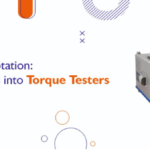Torque testing is vital in terms of the quality safety and performance of products. In an industry that relies on threaded fasteners, caps, or rotating machinery an accurate and reliable torque tester digital system is indispensable to all industries. But how would a torque testing machine really stand out? Let’s find out about cutting-edge technologies and methodologies empowering modern industry today. Whether you’re looking for innovative solutions or striving for unmatched precision, this guide is your gateway to mastering torque testing.
Understanding Torque Testing
Torque is simply the rotational force applied to an object. It’s an essential parameter in industries like automotive, aerospace, pharmaceuticals and packaging. Torque is calculated using the formula:
Torque(τ)=Force(F)×Distance(r)
Where:
τ: Torque (measured in Newton-meters, Nm)
F: Force applied perpendicular to the axis of rotation (measured in Newtons, N)
r: r stands for the distance from the axis of rotation to the point of application of force
This equation is the foundation of measuring torque, with repeatability and reliability.
Evolution of Torque Tester Machines
Those days are long gone when manual torque testers ruled the market. Today, digital torque testers and automatic torque testers boast unparalleled precision, user-friendly interfaces, and advanced analytics. Let’s break it down:
- Manual Torque Testers
Manual testers rely heavily on operator skill and experience. While they are cost-effective, their accuracy can vary.
- Digital Torque Testers
Equipped with sensors and microprocessors, digital torque testers offer real-time data acquisition, storage, and analysis. They can measure torque with an accuracy of up to .
- Automatic Torque Testers
Automatic torque testers revolutionize efficiency by automating the application and measurement process. They are ideal for high-throughput environments, ensuring consistency across thousands of tests.
Key Features of Advanced Torque Measurement Equipment
Modern torque testing machines boast features that cater to demanding industrial requirements. Some key aspects include:
- High-Precision Load Cells
Advanced torque testers use strain gauge-based load cells with linearity and hysteresis below 0.03%, ensuring precise measurements.
- Dynamic Range and Sensitivity
State-of-the-art torque measurement equipment supports wide dynamic ranges, typically from 0.1 Nm to 1000 Nm, catering to diverse applications.
- Integrated Software
- Seamless integration with software enables:
- Real-time graphing of torque curves.
- Statistical analysis like Cp, and Cpk values for quality control.
- Exporting data to industry-standard formats.
- Temperature and Environmental Compensation
High-end machines offer compensation for temperature variations (-10°C to 50°C) and environmental factors, maintaining accuracy under challenging conditions.
- Safety Protocols
Torque testers have inbuilt safety features, such as overload protection and emergency stop functionality.
Uses of Torque Testing Machines
Torque testing is a common preventive measure used by the Pharmaceutical Industry to ensure the integrity of child-resistant and tamper-evident packages. Take an automatic torque tester capable of checking the opening torque of a bottle cap in milliseconds, for example.
- Automotive Sector
Critical components like engine bolts and wheel nuts require precise torque. Digital torque testers ensure that the industry standards, such as ISO 6789, are met.
- Aeronautics
Based on safety concerns, torque meters help prevent fasteners on turbines and wings and in important assemblies from loosening up in aerospace applications.
- Consumer Goods
Torque testers ensure jar lid closing and cosmetic packaging is easy to use and performative adequacy.
Presto’s Expertise: 40 Years of Experience and Excellence
With over 40 years of experience and expertise, we have been pioneers in precision testing. Our torque testers come with innovation and reliability together, addressing the needs of industries diversely. Our field-proven designs, precise sensors, and seamless software integration speak of the commitment made to excellence. Presto is a renowned leader in torque measurement with thousands of successful installations around the world.
How to Choose the Right Torque Tester Machine
The following are the considerations involved in choosing the right torque testing machine:
- Application-Specific Requirements
Identify the torque range, accuracy, and environmental conditions relevant to your use case.
- Ease of Use
Choose user-friendly interfaces with minimal training requirements.
- Data Analysis Capabilities
Ensure the machine supports advanced analytics and data export options.
- Durability and Maintenance
To ensure durability and maintenance make sure that you choose models that consist of proven track records.
FAQs
1. What’s the difference between digital torque testers and automatic torque testers?
A digital torque tester displays actual readings and will be a manual operation, but an automatic torque tester operates in auto-application mode, which reduces effort, inconsistency, and error possibilities.
2. How does one check for torque accuracy?
Torque accuracy is checked by comparing it with traceable standards using certified weights and devices.
3. Will a torque tester read torque both clockwise and counterclockwise?
Yes, most modern torque testing machines can measure torque in both directions.
Conclusion
The right torque tester machine is a necessity for product quality and adherence to industrial standards. Digital torque testers to advanced automatic systems make up the entire range that caters to diverse industrial needs. Presto’s torque measurement equipment embodies decades of expertise, empowering businesses to achieve precision and reliability. By integrating cutting-edge technology with robust engineering, torque testing has truly been redefined.
Mail: info@prestogroup.com
Phone: +91-9210 903 903

